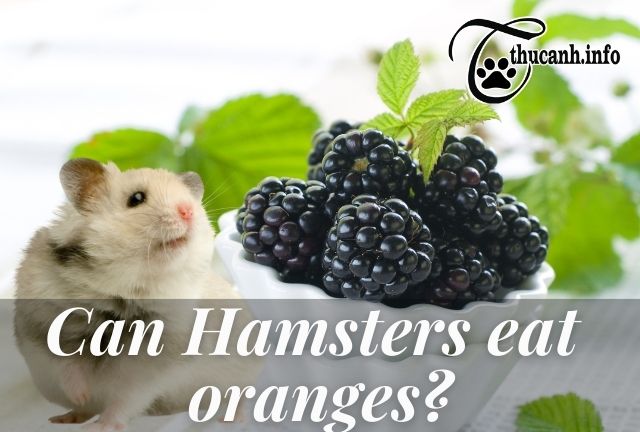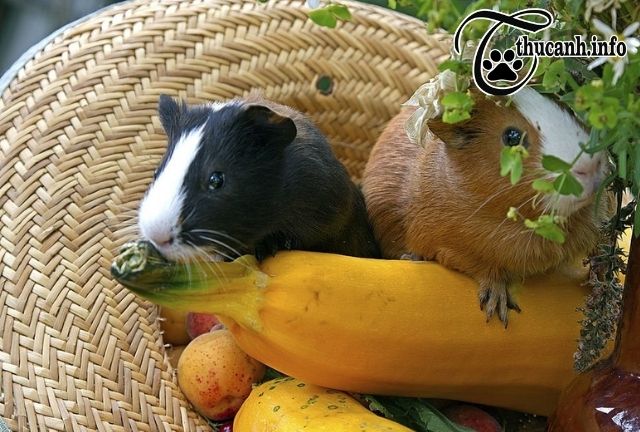Can Hamsters Eat Blackberries? Hamsters are adorable pets that require a balanced diet to stay healthy and happy. Their diet should include a variety of foods to provide essential nutrients such as protein, carbohydrates, vitamins, and minerals. The main part of their diet is usually a commercial hamster food mix. However, adding fresh fruits and vegetables to their diet can be beneficial. In this article, we’ll explore whether hamsters can eat blackberries and discuss their fruit diet in general.

Is it good or bad for hamsters to eat blackberries?
1. Can Hamsters Eat Blackberries?
Yes, hamsters can eat blackberries. Blackberries are safe for hamsters to consume as an occasional treat in moderation. They are a good source of vitamins, minerals, and antioxidants that can be beneficial to a hamster’s health. However, like any treat, they should be given in small amounts to prevent digestive issues or obesity. Always wash the blackberries thoroughly before offering them to your hamster, and remove any seeds or pits to avoid choking hazards. Additionally, ensure that blackberries are part of a balanced diet and not the primary food source for your hamster.
2. Nutritional Benefits of Blackberries for Hamsters
Blackberries are a good source of various nutrients that can benefit hamsters when offered in moderation. Here are some nutritional facts about figs in 100 gam:
| Nutrient | Amount | Benefits |
|
Calories |
43 kcal |
Provides energy for hamsters’ daily activities |
| Carbohydrates |
9 g |
Aids in providing quick energy |
|
Fiber |
5.3 g |
Supports healthy digestion and bowel movement |
|
Sugars |
4.5 g |
Adds natural sweetness to the diet |
|
Protein |
1.3 g |
Helps in tissue repair and growth |
|
Vitamin C |
21 mg |
Boosts the immune system and promotes overall health |
|
Vitamin K |
19.8 µg |
Supports blood clotting and bone health |
|
Potassium |
162 mg |
Regulates fluid balance and muscle function |
|
Calcium |
29 mg |
Aids in bone health and muscle function |
|
Magnesium |
20 mg |
Supports nerve and muscle function |
|
Iron |
0.4 mg |
Assists in oxygen transport in the blood |
|
Antioxidants |
Various |
Protects cells from damage caused by free radicals |

Potential risks when hamsters eat raspberries
3. Potential Risks of Feeding Blackberries to Hamsters
While blackberries can be a nutritious addition to a hamster’s diet, there are some potential risks to consider:
- Choking Hazard: Blackberries have small seeds that could pose a choking hazard to hamsters, especially if given whole.
- High Sugar Content: Blackberries contain natural sugars, and excessive consumption may lead to weight gain or digestive issues.
- Allergic Reactions: Some hamsters may be allergic to blackberries, leading to symptoms like itching, skin irritation, or gastrointestinal upset.
- Pesticides: If not organic or properly washed, blackberries may have pesticide residues, which could be harmful to hamsters.
- Gastrointestinal Upset: Overfeeding blackberries or introducing them too quickly may cause digestive upset in some hamsters.
Always introduce new foods gradually and observe your hamster for any adverse reactions. It’s best to offer blackberries occasionally and in small, appropriate portions to ensure a balanced diet and avoid potential risks.
4. How Many Blackberries Can Hamsters Eat?
Hamsters can eat blackberries as an occasional treat in moderation. A suitable portion for a hamster would be one or two small blackberries, about once or twice a week. Providing a variety of other fresh fruits and vegetables in their diet is essential to ensure balanced nutrition and prevent overfeeding on any single type of food. Always remember to wash the blackberries thoroughly and remove any seeds to prevent choking hazards. Monitoring your hamster’s response to the treat is crucial, and if any digestive issues or allergies arise, it’s best to consult a veterinarian for guidance.
5. Preparing Blackberries for Hamsters
To prepare blackberries for hamsters, follow these steps:
- Wash the blackberries thoroughly under cool running water to remove any dirt or pesticides.
- Remove any stems or leaves from the blackberries.
- Cut the blackberries into smaller pieces to make them easier for your hamster to eat.
- Place the prepared blackberries in your hamster’s food bowl and offer them as a special treat.

Other vegetables that hamster can eat
6. Alternatives to Blackberries for hamsters
If you’re looking for alternative fruits and treats for your hamster, consider the following options:
- Apples: Provide small slices of apple, without seeds or core, as a nutritious and crunchy treat.
- Carrots: Hamsters enjoy the sweetness and crunch of fresh carrot slices as an occasional treat.
- Blueberries: These tiny fruits are rich in antioxidants and can be offered in moderation.
- Strawberries: Offer small pieces of strawberry as an occasional treat for variety in their diet.
- Pears: Offer small pieces of ripe pear as a sweet and juicy treat.
- Raspberries: Like blackberries, raspberries are safe in moderation and provide a different flavor.
- Cucumber: Hamsters enjoy the refreshing taste and crunchiness of cucumber slices.
- Pumpkin Seeds: Remove the shell and offer pumpkin seeds as a tasty and nutritious snack.
- Cooked Plain Chicken: A small, cooked and unseasoned piece of chicken can be a protein-rich treat.
7. Foods to Avoid in a Hamster’s Diet
Certain foods should be avoided in a hamster’s diet to ensure their health and well-being. Here are some foods to steer clear of:
- Chocolate: Contains theobromine, which is toxic to hamsters and can cause serious health issues.
- Sugary Foods: Foods high in sugar can lead to obesity and dental problems in hamsters.
- Processed Foods: Avoid giving your hamster processed and packaged foods meant for human consumption.
- Citrus Fruits: Citrus fruits can cause digestive issues and are best avoided.
- Onions and Garlic: These can be harmful and cause digestive problems in hamsters.
- Avocado: Contains persin, which is toxic to hamsters and should be avoided.
- Potatoes: Raw potatoes can be toxic to hamsters, so avoid giving them any form of potatoes.
- Grapes and Raisins: While not always toxic, they may cause kidney problems in some hamsters.
- Nuts: Certain nuts, like almonds, can be harmful to hamsters due to their high fat content.
- Rhubarb: Contains oxalates, which can be toxic to hamsters.
Always consult with a veterinarian if you are unsure about any specific food’s safety for your hamster. A balanced diet consisting of commercial hamster food along with occasional fresh fruits and vegetables is best for their overall health and happiness.
8. Signs of Blackberries intolerance of Hamsters
- Upset stomach: Hamsters may experience digestive issues such as diarrhea or constipation after eating blackberries.
- Lethargy: If your hamster becomes unusually tired or inactive after consuming blackberries, it could be a sign of intolerance.
- Changes in behavior: Blackberry intolerance might cause irritability or restlessness in hamsters.
- Allergic reactions: Some hamsters may exhibit symptoms like itchiness, swelling, or redness after eating blackberries.
If you notice any of these signs, it’s essential to stop feeding blackberries to your hamster and consult a veterinarian for further advice and to ensure your pet’s health and well-being. Always introduce new foods to your hamster’s diet gradually and observe their reactions closely.
9. Frequently Asked Questions (FAQs)
9.1. Can dwarf hamsters eat blackberries?
Yes, dwarf hamsters can eat blackberries in moderation. Blackberries can be a tasty and nutritious treat for them. However, as with any new food, it’s important to introduce blackberries slowly and observe your hamster for any signs of intolerance or digestive issues. Providing a varied diet with a mix of fresh fruits, vegetables, and hamster pellets is ideal for your pet’s overall health. Always consult a veterinarian if you have any concerns about your dwarf hamster’s diet.
9.2. Can blackberries be given to pregnant or nursing hamsters?
It is generally safe to offer blackberries to pregnant or nursing hamsters in moderation. However, it is essential to remember that their primary diet should consist of appropriate hamster pellets and other recommended foods. Treats like blackberries should only be given as occasional snacks and not constitute the majority of their diet.
Always consult with a veterinarian for specific dietary recommendations for pregnant or nursing hamsters to ensure they receive the appropriate nutrition during this critical time. Additionally, closely monitor their intake and health to detect any signs of intolerance or adverse reactions.
9.3. Are there specific hamster breeds that should avoid blackberries?
All hamster breeds, including Syrian hamsters, Dwarf hamsters (Roborovski, Campbell’s, Winter White), and Chinese hamsters, can safely consume blackberries in moderation as part of a varied and balanced diet. However, individual hamsters may have different dietary preferences and tolerances, so it is essential to observe their reactions to new foods.
If you notice any signs of discomfort or digestive issues after offering blackberries, it’s best to discontinue feeding them to your hamster. Always consult with a veterinarian if you have any concerns about your hamster’s diet or health.
9.4. Can hamsters eat frozen blackberries?
Hamsters can eat frozen blackberries in small amounts as an occasional treat. However, it’s essential to thaw the blackberries and bring them to room temperature before offering them to your hamster. Frozen fruits may be too cold and could cause discomfort or digestive issues if consumed directly from the freezer. Remember to introduce new foods gradually and monitor your hamster’s reaction to ensure they tolerate frozen blackberries well. As with any treats, moderation is key to maintaining a balanced diet for your furry friend.
9.5. Can Hamsters Eat Raw Blackberries?
Yes, hamsters can eat raw blackberries. Blackberries are safe and nutritious for hamsters when offered in moderation as a treat. However, it’s essential to wash the blackberries thoroughly to remove any pesticides or chemicals before feeding them to your pet. Additionally, make sure the blackberries are fresh and not spoiled or moldy. Introduce new foods gradually to your hamster’s diet to ensure they tolerate them well, and always provide a variety of fresh fruits and vegetables to maintain a balanced and healthy diet for your furry friend.
In conclusion, blackberries are safe and healthy for hamsters to eat in moderation. Fruits should be given as part of a balanced diet that includes commercial hamster food mix, fresh vegetables, and limited amounts of fruit. Always monitor your hamster’s reaction to new foods and consult your veterinarian if you have any concerns about their diet or health. We hope the article “Can Hamsters Eat Blackberries” on Thucanh.info provides you with valuable information.


